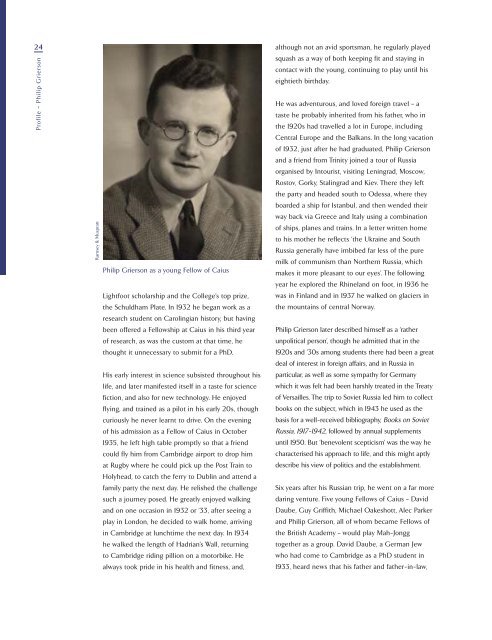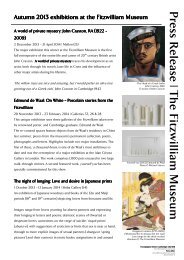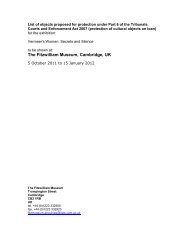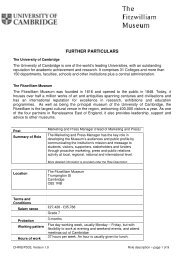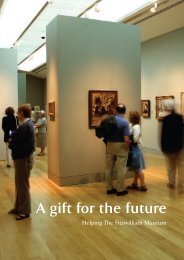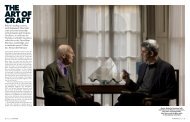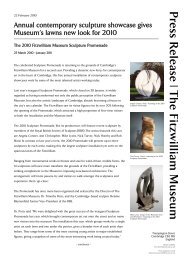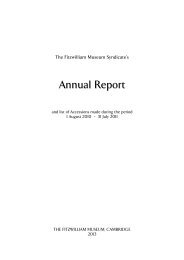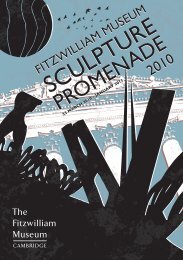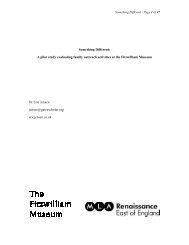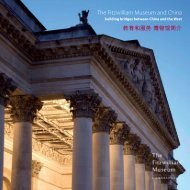The Fitzwilliam Museum - University of Cambridge
The Fitzwilliam Museum - University of Cambridge
The Fitzwilliam Museum - University of Cambridge
Create successful ePaper yourself
Turn your PDF publications into a flip-book with our unique Google optimized e-Paper software.
24<br />
Pr<strong>of</strong>ile – Philip Grierson<br />
Ramsey & Muspratt<br />
Philip Grierson as a young Fellow <strong>of</strong> Caius<br />
Lightfoot scholarship and the College’s top prize,<br />
the Schuldham Plate. In 1932 he began work as a<br />
research student on Carolingian history, but having<br />
been <strong>of</strong>fered a Fellowship at Caius in his third year<br />
<strong>of</strong> research, as was the custom at that time, he<br />
thought it unnecessary to submit for a PhD.<br />
His early interest in science subsisted throughout his<br />
life, and later manifested itself in a taste for science<br />
fiction, and also for new technology. He enjoyed<br />
flying, and trained as a pilot in his early 20s, though<br />
curiously he never learnt to drive. On the evening<br />
<strong>of</strong> his admission as a Fellow <strong>of</strong> Caius in October<br />
1935, he left high table promptly so that a friend<br />
could fly him from <strong>Cambridge</strong> airport to drop him<br />
at Rugby where he could pick up the Post Train to<br />
Holyhead, to catch the ferry to Dublin and attend a<br />
family party the next day. He relished the challenge<br />
such a journey posed. He greatly enjoyed walking<br />
and on one occasion in 1932 or ’33, after seeing a<br />
play in London, he decided to walk home, arriving<br />
in <strong>Cambridge</strong> at lunchtime the next day. In 1934<br />
he walked the length <strong>of</strong> Hadrian’s Wall, returning<br />
to <strong>Cambridge</strong> riding pillion on a motorbike. He<br />
always took pride in his health and fitness, and,<br />
although not an avid sportsman, he regularly played<br />
squash as a way <strong>of</strong> both keeping fit and staying in<br />
contact with the young, continuing to play until his<br />
eightieth birthday.<br />
He was adventurous, and loved foreign travel – a<br />
taste he probably inherited from his father, who in<br />
the 1920s had travelled a lot in Europe, including<br />
Central Europe and the Balkans. In the long vacation<br />
<strong>of</strong> 1932, just after he had graduated, Philip Grierson<br />
and a friend from Trinity joined a tour <strong>of</strong> Russia<br />
organised by Intourist, visiting Leningrad, Moscow,<br />
Rostov, Gorky, Stalingrad and Kiev. <strong>The</strong>re they left<br />
the party and headed south to Odessa, where they<br />
boarded a ship for Istanbul, and then wended their<br />
way back via Greece and Italy using a combination<br />
<strong>of</strong> ships, planes and trains. In a letter written home<br />
to his mother he reflects ‘the Ukraine and South<br />
Russia generally have imbibed far less <strong>of</strong> the pure<br />
milk <strong>of</strong> communism than Northern Russia, which<br />
makes it more pleasant to our eyes’. <strong>The</strong> following<br />
year he explored the Rhineland on foot, in 1936 he<br />
was in Finland and in 1937 he walked on glaciers in<br />
the mountains <strong>of</strong> central Norway.<br />
Philip Grierson later described himself as a ‘rather<br />
unpolitical person’, though he admitted that in the<br />
1920s and ’30s among students there had been a great<br />
deal <strong>of</strong> interest in foreign affairs, and in Russia in<br />
particular, as well as some sympathy for Germany<br />
which it was felt had been harshly treated in the Treaty<br />
<strong>of</strong> Versailles. <strong>The</strong> trip to Soviet Russia led him to collect<br />
books on the subject, which in 1943 he used as the<br />
basis for a well-received bibliography, Books on Soviet<br />
Russia, 1917-1942, followed by annual supplements<br />
until 1950. But ‘benevolent scepticism’ was the way he<br />
characterised his approach to life, and this might aptly<br />
describe his view <strong>of</strong> politics and the establishment.<br />
Six years after his Russian trip, he went on a far more<br />
daring venture. Five young Fellows <strong>of</strong> Caius – David<br />
Daube, Guy Griffith, Michael Oakeshott, Alec Parker<br />
and Philip Grierson, all <strong>of</strong> whom became Fellows <strong>of</strong><br />
the British Academy – would play Mah-Jongg<br />
together as a group. David Daube, a German Jew<br />
who had come to <strong>Cambridge</strong> as a PhD student in<br />
1933, heard news that his father and father-in-law,


